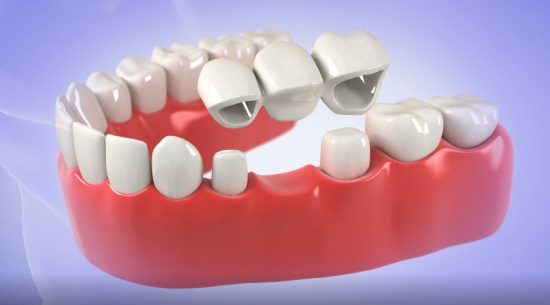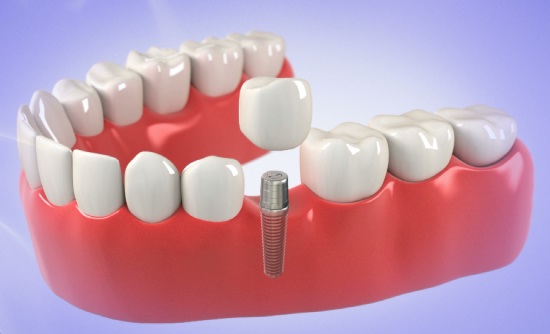Having trouble deciding between dental implants and dental bridges? Both are great options for replacing missing teeth. We offer both high quality dental implants and teeth bridges and we can help. Whatever your questions are – about the procedure or cost or how they compare – we’ve got the answers and will help you decide what’s best for you.

Dental Bridges

What are Dental Bridges?
Bridges are non-removable dental prostheses that are designed to replace more than one missing teeth. Dental bridges, unlike dentures, are attached to and supported on either side of the missing tooth, by either your natural teeth or by dental implants.
Dental Implants

What are Dental Implants?
An implant is surgically placed into the jawbone where it will function as the root portion for an artificial tooth. The implanted root resembles a screw and it will allow a prosthesis – such as a crown, bridge or dentures – to be placed over it. Implants can restore one missing tooth or even a full mouth rehabilitation of edentulous – also known as toothless – jaws.
How are Bridges Prepared?
Bridges are prepared in multiple steps, which are the evaluation, fabrication and placing of the bridge.
- Clinical Evaluation – One of our specialists will thoroughly examine your teeth and review any radiographs, computer imaging and dental records first. This allows the dentist to evaluate what needs to be done as well as make sure that this procedure is the best option.
- Teeth Preparation – The teeth which will support the bridge are prepared next. This is done by removing a small amount of the natural tooth structure which creates the space for the bridge to be attached over the tooth. The dentist will anesthetize your mouth, just in case there is a chance of exposing the tooth.
- Impression Making – Once the teeth are prepared in this way, an impression will be made and sent to the lab for fabricating the bridge.
- Attaching the Bridge – Once the bridge is made it will then be sent to our office. The dentist will make sure the bridge fits well and looks great in your mouth first, then it will be affixed to the prepared teeth with cement made for dental work. Read more about our other cosmetic dentistry offerings.
How Dental Implants Work?
Dental implants are most commonly made with titanium or similar alloys, which are used because they have unique properties which promote bone formation around the implant itself. This allows the implant to fully set within the jaw bone, in a process called osseointegration. This makes the implant, both fixed and removable, strong and long lasting.
How are Dental Implants Placed?
Placing your dental implants is done in two to three steps. Or, in some cases, it can be done on the same day. Our dentist will first evaluate your records and any imaging of your mouth, as well as perform a thorough exam. Next, the tissue over the bone where the implant is to be placed will be anesthetized. The soft tissue will then be incised then a flap raised to allow a hole to be drilled into the jaw bone and the implant carefully inserted.
How is the Implant Loaded?
For patients who are scheduled for implant loading at a later date, a healing screw will be inserted over the implant and the flap sutured. For patients who are receiving a same day implant, the chosen prosthesis – permanent dentures, a crown or a bridge – will be attached to the implant right away. Otherwise, the prosthesis will not be placed until the patient has had time to fully heal.
Pros of Teeth Bridges
Teeth bridges are recommended for our patients in the following scenarios:
- Aesthetics – Missing teeth replaced with a dental bridge are more aesthetically pleasing than those replaced with removable dentures.
- More Durable than Removable Dentures – Because bridges are made with high quality, stronger materials than are used with removable dentures, bridges tend to last longer.
- Restoration of Dental Function – Where dentures require more care when eating certain foods, teeth bridges are affixed to your teeth permanently and function more like natural teeth. You will be able to enjoy the foods you love and not be concerned about the stability of the replacement teeth.
- Restoration of Normal Occlusion – After losing a tooth which is not immediately replaced, the teeth on either side will move into the open space. By using a dental bridge to replace the lost tooth, balanced occlusion is restored. This keeps the teeth next to the lost tooth from migrating into the open space.
The Pros of Dental Implants
Dental implants are now one of the most popular tooth replacement options available. Here are just a few of the many advantages of replacing a missing tooth with dental implants:
- Improved Smile – Visually pleasing bridges, crowns, or dentures are attached over the implants which will dramatically change your smile and even your oral health as a whole. In contrast with teeth bridges, prostheses supported by implants give you better facial contouring and features.
- Durability – Because dental implants are made from titanium alloys, they are extremely strong. This strength also makes the prostheses placed on them longer lasting as well. Maintaining good oral hygiene can allow your dental implants to last for a lifetime.
- Convenience – Because dental implants feel and function like natural teeth, you’ll be able to eat and talk without any adjusting or inconveniences.
- Easy to Maintain Oral Hygiene – Where extra attention must be given to oral hygiene when you have bridges, dental implants do not require any special care. It can be challenging to keep the area under the bridge structure clean because it is difficult to reach. On the other hand, you simply need to brush implant supported teeth as you would your natural ones.
- Safety – As mentioned before, implants are made using titanium alloys, which are not only durable but also biocompatible and will not cause any allergic reactions or toxicity in your body.
Cons of Teeth Bridges
- Sacrifice of Natural Tooth Structure – While preparing the natural teeth that the bridge is going to be attached to, it may be necessary to alter or sacrifice them in order to attach the bridge.
- Limited Clinical Service Life – Even with diligent care to ensure the best oral health, the average life of dental bridges is about five to seven years. New bridges will then need to be prepared and placed.
What are the Cons of Dental Implants?
- Success is Dependent upon Surgical Technique – A successful dental implant depends on the expertise of your dentist. Even a small mistake during the surgical portion of the treatment could cause peri-implantitis, which could lead to further problems. The good news is that this is not a concern for the implants we offer. We have an excellent implant success ratio because we have a team of talented dentists and specialists with exceptional surgical skills who will place your implants.
- High Cost – If you compare the cost of dental implants and removable dentures or bridges, the difference is substantial but if you compare the benefits, the convenience, not to mention the other advantages, makes this offering an excellent value.
Which Option Should You Choose?
Not sure which is the right choice for you? Our staff of talented and trained dentists in OC advise you to get the best permanent teeth replacement available. It comes down to which will suit your needs in aesthetics, strength and durability. Don’t wait another moment to replace those missing teeth. Make an appointment today at our dental office in Fullerton, in beautiful Orange County, California. and find out how you can start smiling again with new implant-supported teeth.
Published on January 6, 2019, Updated on April 10, 2020
